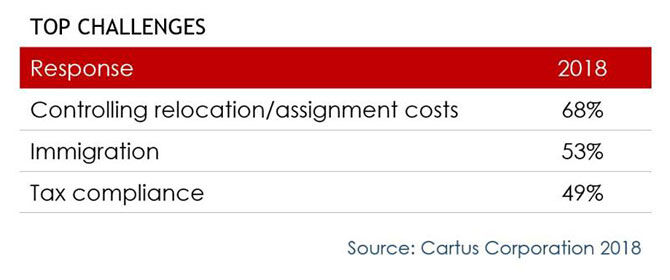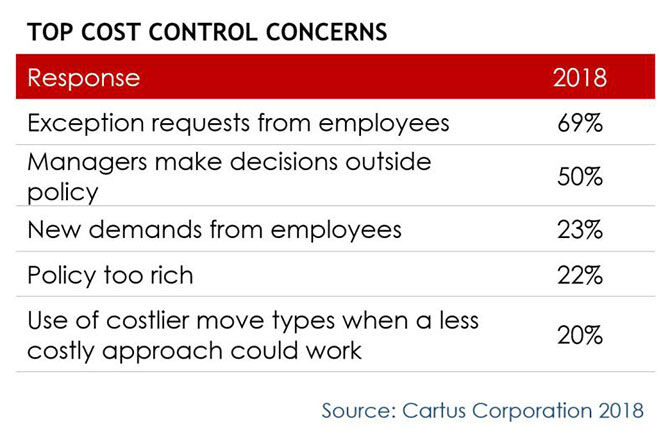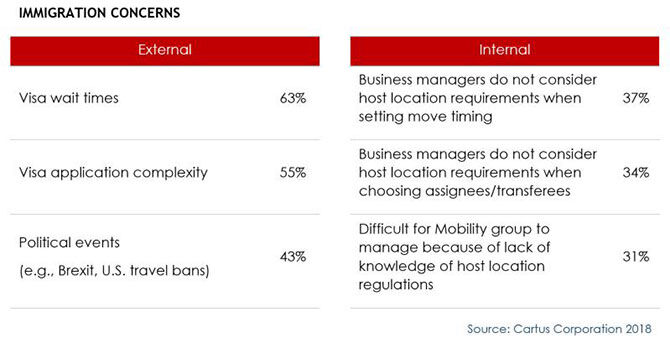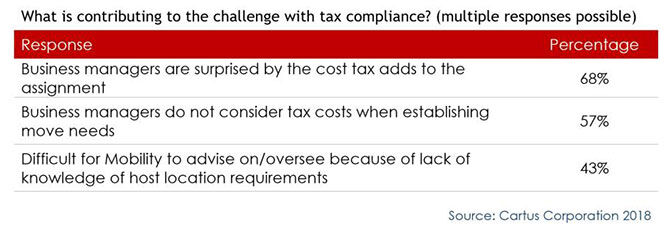Immigration increasingly a challenge for mobility managers
Controlling costs remains the greatest challenge facing global mobility managers, according to a recent survey. However, immigration rose sharply as a concern for mobility teams.


The top three relocation challenges:
Cost Control
Cost control continues to hold at the top spot as the most frequently cited challenge by survey participants, although only 44 per cent of respondents say cost is a bigger concern than in previous years.Ultimately, cost savings concerns aren’t new, they’re just a fact of life for relocation managers when it comes to managing mobility.However, two new types of concerns about cost control have also surfaced: new demands from employees ranked third and the use of costlier move types when a less costly approach could be used ranked fifth among respondents.Commentary from respondents sheds additional light on cost control challenges, citing that hiring managers who do not understand where relocation dollars are best spent often contribute to cost control issues.Regarding what steps companies are taking to address the management of cost control, 72 per cent of respondents said they have focused on educating decision makers about costs. The steps companies have taken to address cost control concerns, include educating decision-makers about costs, the use of flexible policies, the use of data analytics to identify opportunities for cost savings and educating employees about the costs associated with relocation.
Immigration
Immigration has emerged as a top challenge this year, with 70 per cent of respondents stating that it’s a greater concern for their organisations than last year.There may be several reasons for this, such as: more companies, new to international mobility, may not have the resources in place to support immigration or do not yet realise the complexity of it, more companies are sending employees to new regions and countries where immigration considerations are very different from what they’re used to, and these companies may be developing a greater awareness of the consequences of noncompliance. What’s contributing to the challenges with immigration? There are two primary categories. Externally, visa complexity and political influences such as Brexit and U.S. travel bans and policies are high on the list. Internally, factors related to improving awareness of external conditions and what to do about them can be a challenge.While the external factors remain consistent with 2015 findings, the internal company factors have changed significantly over the past two years.This may be because the growth in the involvement of business managers in the relocation/assignment process has addressed challenges, but has also led to new ones. Business managers may not be aware of the obstacles presented by a host location’s approach to immigration, and could be making decisions that are costly, time consuming or unable to be implemented. Almost one in three respondents in the survey (31 per cent) found that a lack of knowledge within mobility can be a contributor to this challenge. It’s not surprising, then, that the top three ways respondents say they are addressing immigration issues is to provide more information to those who need it: 76 per cent stated they are engaging in better communication with managers, 56 per cent are focusing on providing more information to employees and 32 per cent are adding expertise to their teams, either through internal staff or an external partner.
Tax Compliance
Of all respondents, 42 per cent stated that tax compliance has become a larger concern for their organisations. While there may not be a majority of survey participants who see this as a growing issue, clearly, it’s still a significant challenge for many companies. In Cartus’ 2018 survey, the key issue appears to be coming from business managers who are surprised by the cost that tax adds to an assignment and business managers who do not consider tax costs when establishing move needs.Additionally, mobility leaders acknowledged that it’s difficult for mobility to advise on or oversee tax compliance because of their lack of knowledge of host location requirements. Challenges with tax compliance seem to emerge from an issue that was raised by respondents regarding immigration: business managers make decisions that impact the company from both cost and compliance standpoints, at least in part because they do not know what they need to do differently and those they rely on for that knowledge don’t necessarily have access to the information they need. The good news is, 64 per cent of respondent companies noted that they’re addressing tax compliance issues through better communication and 58 per cent of survey participants said that they’re requiring the use of a company-designated tax return preparation service to combat the problem.
A Common Thread
When we consider the top three challenges above, it seems that the importance of informing and educating relocation decision makers is extremely important. A lack of this influence causes cost increases and decreases efficiency. When managers are given the information they need regarding how relocation dollars can be best spent, how host locations and taxes can impact cost and how the overall complexities of a host country can impact immigration, tax compliance and the myriad of other challenges associated with relocation, surprises can be avoided and challenges minimised.
For related news and features, visit our International Assignments section. Look out for the launch of 2018’s Relocate Awards, entry is now open. Relocate’s new Global Mobility Toolkit provides free information, practical advice and support for HR, global mobility managers and global teams operating overseas.
 Access hundreds of global services and suppliers in our Online Directory
Access hundreds of global services and suppliers in our Online Directory
©2025 Re:locate magazine, published by Profile Locations, Spray Hill, Hastings Road, Lamberhurst, Kent TN3 8JB. All rights reserved. This publication (or any part thereof) may not be reproduced in any form without the prior written permission of Profile Locations. Profile Locations accepts no liability for the accuracy of the contents or any opinions expressed herein.









































